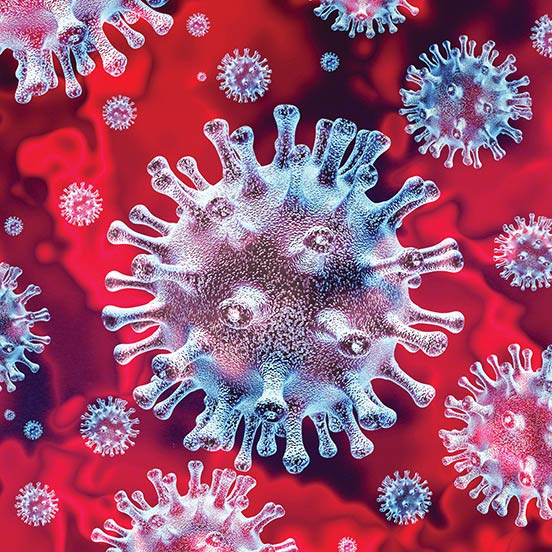Home Dialysis and Coronavirus (COVID-19): Staying Safe

Keeping you healthy and safe is our top priority.As the COVID-19 situation continues to change, we are working to protect you and your care team while you continue your home dialysis treatment.
WHAT TO DO IF YOU THINK YOU ARE SICK
Safety for people doing home dialysis
Your care team is taking steps to help reduce the chance of COVID-19 transmission. In addition to taking everyday steps to help keep you safe, like proper handwashing, staying home as much as possible, and keeping 6 feet away from other people, follow these simple guidelines for home dialysis:
- All individuals should have a 30-day supply of antibacterial pump soap, hand sanitizer, and face masks at home.
- If you or a family member develops fever, cough, or other symptoms, please contact your home nurse by phone for further instructions. Do not come to the dialysis center.
- For required in-person center visits, all individuals will be asked about fever, cough, and foreign travel. Everyone entering the center will be required to wear a mask.
- Any employee visiting your home to provide service to equipment or for any other reason will be required to wear a mask before entering. Visitors should perform hand hygiene upon entering and before leaving your home. You should also wear a mask during the visit and perform hand hygiene.
- Any person delivering dialysis equipment or supplies should also wear a mask before entering. Visitors should perform hand hygiene upon entering and before leaving your home. You should also wear a mask during the delivery and perform hand hygiene.
- If you require a home visit, you and your family will be required to wear a mask, as well as anyone entering your home. All participants will be required to perform good hand hygiene.
- Equipment swaps, biomedical support, and routine machine maintenance will be performed as needed. Biomedical support will continue to be provided, though routine machine maintenance may be rescheduled.
- If you or a family member test positive for COVID-19 or are in quarantine, you will still receive needed care. If you are healthy, we will try to keep you at home. If one of our employees visits during this time, they will wear full personal protective equipment (PPE) and you and your family will be required to wear a mask.
Managing your food and home dialysis supplies during COVID-19
- Prescription and medical supply delivery
- Online grocery delivery
- Friends or family shopping for you and dropping off items on your doorstep
TIP: Ask your dietitian for recommendations on kidney-friendly foods and fluids that keep well on the shelf. Some items to keep on hand may include:
- Canned fruit—pears, peaches, pineapple, or mixed fruit
- Canned low- or no-salt vegetables—carrots, green beans, peas, or corn
- Canned low- or no-salt meats—tuna, salmon, chicken, or turkey
- All-natural nut butter
- Jelly or honey
- Bread and cereal
- Canned evaporated milk, boxed nut milk, or boxed rice milk
The benefits of home dialysis during social distancing
One added benefit of doing home dialysis instead of in-center dialysis, is that you’re able to stay on schedule with dialysis without having to leave the house or increase your risk of exposure. You may also be able to use telehealth for monthly medical appointments that you usually have in person. Of course, support from your care team is just a phone call or message away, anytime you need it.
Telehealth options can help you get the care you need
To get started, you'll need:
- A plugged-in or fully charged, internet-enabled device with a camera—such as a smartphone, tablet, or computer
- A high-speed internet connection—like DSL, a cable modem, Wi-Fi, or an unlimited data plan
- A quiet, private, well-lit area for the visit
How to manage anxiety during COVID-19
The COVID-19 situation is still relatively new—and many people are dealing with a mix of emotions from day to day. If you’re feeling anxious, depressed, or worried, you are not alone. The new routines you’re following to help protect your health can change things—including your daily schedule, your work life, your usual habits and hobbies, and your emotional wellbeing. To help manage anxiety and stress, consider these tips:
- Keep up with your normal routine—this includes staying on schedule with dialysis and keeping up with care team appointments. Completing your full dialysis treatment will help you stay your healthiest and feel your best.
- Think about limiting coronavirus news coverage—COVID-19 is online, on TV, and in our daily interactions. It’s very easy to get overwhelmed by all of the information and opinions. Staying informed is good, though being surrounded by stressful news can also affect your emotions. Consider limiting the amount of news you read or watch.
- Recognize symptoms of anxiety or depression—everyone copes with stress a little differently. Noticing the signs and symptoms—constant worry, headache, nausea, or tiredness—can be a sign to seek stress relief.
- Find ways to cope that work for you—taking good care of your wellbeing means dealing effectively with stress or anxiety. To manage your mental and emotional health, try simple steps like stepping outside for some fresh air, calling a friend, getting some exercise, or making time to read a good book.
Working from home while on dialysis
If you usually work at an office or other place of business and you’re now working from home, your routine might be a little different. Here are some tips for making adjustments to working while on dialysis at home:
If working from home changes when it’s most convenient for you to do dialysis, talk to your care team about adjusting your treatment schedule. Working from home may even give you more freedom with scheduling dialysis. If you think treatment will affect your work schedule at all, check in with your supervisor or boss.
Plan ahead for any changes in how you get your medication or supplies
If you usually pick up prescriptions or treatment supplies, plan to have them delivered so you can avoid going to the pharmacy. If you’re already ordering for delivery, you may want to look at increasing amounts per order to cut down on the number of deliveries. Talk to your care team for more ideas on managing home dialysis during COVID-19.
Keep your healthy, kidney-friendly eating habits
Working from home also means full access to your kitchen. This can make it tempting to snack more often—especially if you’re stressed. Plan some go-to kidney-friendly meals and snacks and stick to a schedule, so you can feel your best.
Suggested topics

In-Center Dialysis and Coronavirus (COVID-19): Protecting Your Health
Your health is our top priority. As the COVID-19 situation continues to develop, we are taking additional steps in our dialysis centers to...
Managing Stress and Kidney Disease
Dealing with any chronic health condition can be stressful. It’s understandable—and completely normal—to have ups and downs...
Working Together to Stay Healthy in Stressful Times
Fresenius Kidney Care is dedicated to helping you stay healthiest and feel your best—no matter what the circumstances. The safety and...
